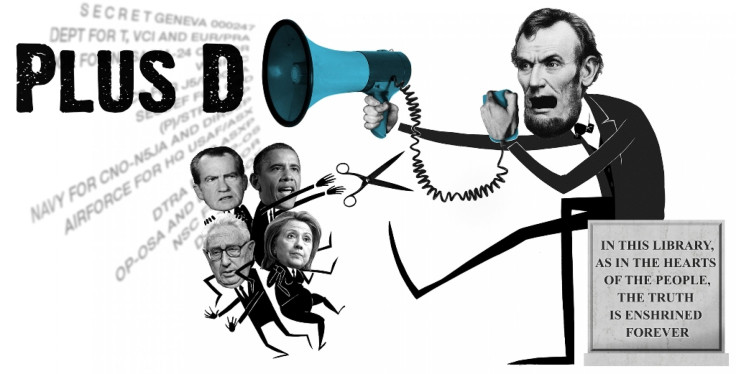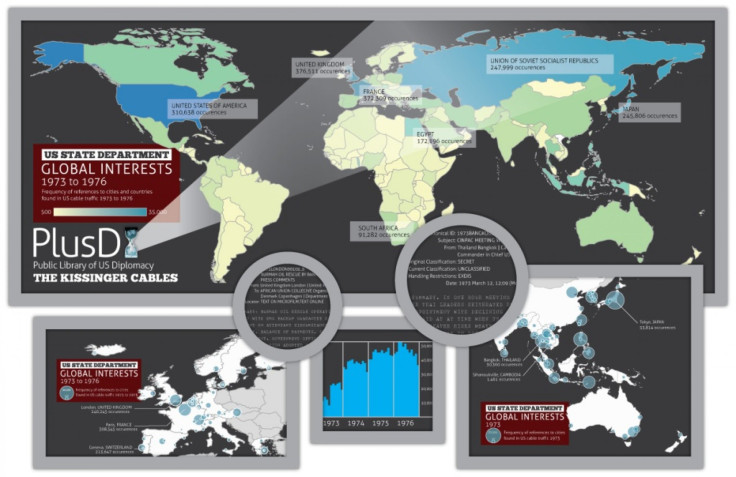WikiLeaks Public Library Of US Diplomacy (PlusD): A Searchable Database With Over 2 Million Records Revealing Secrets Of America’s Diplomatic History

Here’s another big release from the world’s most controversial whistleblowing outlet Wikileaks about the United States of America but in a different and more revealing manner, accoridng to a “search engine.”
Late Sunday, the infamous publisher of secret classified documents launched the Public Library of U.S. Diplomacy, or PlusD, which it advertises as “the world's largest searchable collection of the United States confidential, or formerly confidential, diplomatic communications.”
WikiLeaks claims in a press release that as of Monday, PlusD contains 2 million records (approximately 1 billion words) that cover “U.S. involvements in, and diplomatic or intelligence reporting on, every country on Earth.” It states PlusD “is the single most significant body of geopolitical material ever published -- now that's what we call a search engine.”
The major portion of WikiLeaks’ new Public Library holds more than 1.7 million U.S. diplomatic records for the period from Jan. 1, 1973, to Dec. 31, 1976. Coined the “Kissinger Cables,” the leaked records cover various diplomatic communications, including cables, intelligence reports and congressional correspondence. The collection contains roughly 700 million words, which is five times the size of Cablegate, a set of more than 250,000 U.S. diplomatic cables originally published by WikiLeaks from November 2010 and over the following year.

The records, the most notable of which relate to the tenure of former controversial Secretary of State Henry Kissinger, contain what WikiLeaks describes as “significant revelations about U.S. involvements with fascist dictatorships, particularly in Latin America, under Franco's Spain (including about the Spanish royal family) and in Greece under the regime of the colonels.”
“The government can’t be trusted with its own archives,” WikiLeaks spokesperson Kristinn Hrafnsson said, explaining the shift from publishing leaked secret material to declassified documents. “One form of secrecy is complexity. That’s the reason why we decided to merge these files with our existing cables and put a lot of effort into making a user-friendly and accessible database.”
WikiLeaks reveals that the records were reviewed by the United States Department of State's systematic 25-year declassification process. After that, the records were reviewed again by the National Archives and Records Administration, or NARA. Once believed to be releasable, they were placed as individual PDFs at the National Archives as part of their Central Foreign Policy Files collection.
“The form in which these documents were at NARA was 1.7 million individual PDFs,” WikiLeaks says. “To prepare these documents for integration into the PlusD collection, WikiLeaks obtained and reverse-engineered all 1.7 million PDFs and performed a detailed analysis of individual fields, developed sophisticated technical systems to deal with the complex and voluminous data and corrected a great many errors introduced by NARA, the State Department or its diplomats.”
According to a report by the Daily Mail, much of the work for PlusD is carried out by WikiLeaks founder Julian Assange himself, who has been staying in the Ecuadorian Embassy in London since last summer. Assange sought refuge at the embassy in June last year, fearing that he would be sent to the U.S. if he was extradited to Sweden to face sexual assault claims by two women, the report adds.
Forbes reports that the reason behind WikiLeaks’ shift toward older documents could be part of its lack of an anonymous submission system since late 2010. The report says that, ever since then, the majority of WikiLeaks’ leaks have reportedly been sourced from hacker group Anonymous.
“Our projects are varied,” Hrafnsson told Forbes. “This is a public service that should have been in the hands of the government.”
Take a look at some of the tweets from WikiLeaks that highlight certain key revelations by the "Kissinger Cables":
“Kissinger Cables reveal the Vatican dismissed Pinochet atrocities as "communist propaganda" - L'Espresso (Italian) | espresso.repubblica.it/dettaglio/il-vaticano…”
“WIKILEAKS Kissinger Cables: Rajiv Gandhi was “main Indian negotiator” for a corrupt Swedish aircraft deal | thehindu.com/news/national/rajiv-gandhi …”
“WIKILEAKS Kissinger Cables: 21 UFO documents highlight UFO concern, but for Ghana, "It's the French!" search.wikileaks.org…”
“CIA and other agencies history of attempting to reclassify the US National Archives is now thwarted by PlusD | search.wikileaks.org/plusd/pressrelease/?nocache …”
Click here to check out PlusD, where more than 2 million U.S. diplomatic docs are now fully searchable in text, map, grid and graph form.
© Copyright IBTimes 2024. All rights reserved.












